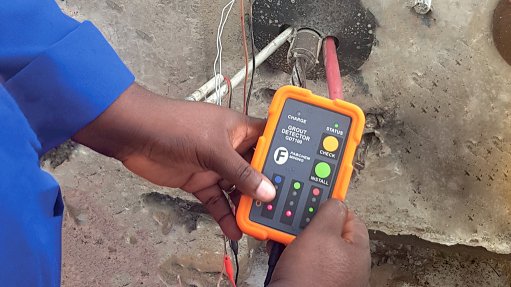
Strata control solutions provider Fabchem Mining’s internationally patented grout detector, the GDT100, has been recognised by rock engineers as an important tool in the prevention of fall-of-ground (FOG) incidents, as mines globally aim for zero harm.
Mine safety standards and the associated legal liabilities are a big driver in the uptake of the GDT100, with mines seeking to move away from a culture where a certain number of FOG incidents and related injuries and fatalities are seen as “acceptable”.
Following slow demand since its launch in 2018, interest in the GDT100 has subsequently picked up and is expected to increase this year, says Fabchem CEO Freddy Mugeri.
“Our grout detector ensures the integrity of anchor installations in underground mining operations to prevent FOG. Without assuring the integrity of anchors, miners will only be aware of potential safety issues when it’s too late.”
Fabchem’s technology allows users to repeatedly achieve the same results under the same conditions, which is something none of the company’s competitors have been able to achieve, states Mugeri.
The GTD100 grout detector is a handheld device used to provide assurance that an anchor has been full column grouted during and after installation of cable anchors. It uses up to three colour coded proprietary Fabchem sensors (red, blue and green) which are attached to the cable anchor.
The product was created to fill the gap in the mining industry for a product that could help rock engineers consistently control the integrity of hanging and side walls of underground excavations during and after a cable anchor installation.
“Finding a solution that worked took some serious creativity and experimentation, as we needed to identify frequencies that can generate predictable and consistent results,” adds Mugeri.
The GDT100 grout detector took about two years to finalise. Once it achieved the desired results, Fabchem conducted global research, which revealed the novelty of its idea, as no other company in the world had succeeded in creating a similar product.
The grout detector is manufactured in Springs, Gauteng, and comprises 90% local content. The device is marketed worldwide, with Fabchem already exporting the grout detector to Australia and South America. But, while opportunities are present worldwide, Fabchem is currently focused on the South African market.
“We need the product to be hugely successful at home to support our export drive,” notes Mugeri.
The current version of the grout detector is compatible with Windows 7 and Windows 10 operating systems and can store at least 2 500 records on non-volatile memory, retaining data after power is removed. The device is powered by a rechargeable lithium polymer battery, which takes about four hours to charge, and offers a four-week battery life, equating to 40 installations a day.
A standard Mini-USB cable is used to download records and charge the battery. The detector can either be charged using a personal computer or any cell phone charger with a standard USB 5 V output.
The grout detector also includes a shock-proof silicone cover, flame-resistant plastic enclosure and has an Ingress Protection (IP) rating of IP54, meaning water splashed against the machine from any direction will have no harmful effect.
“Fabchem is constantly making improvements to the GDT100 and, this year, we plan to undertake many technological advancements which will embrace the Fourth Industrial Revolution and will pleasantly surprise the mining community,” enthuses Mugeri.